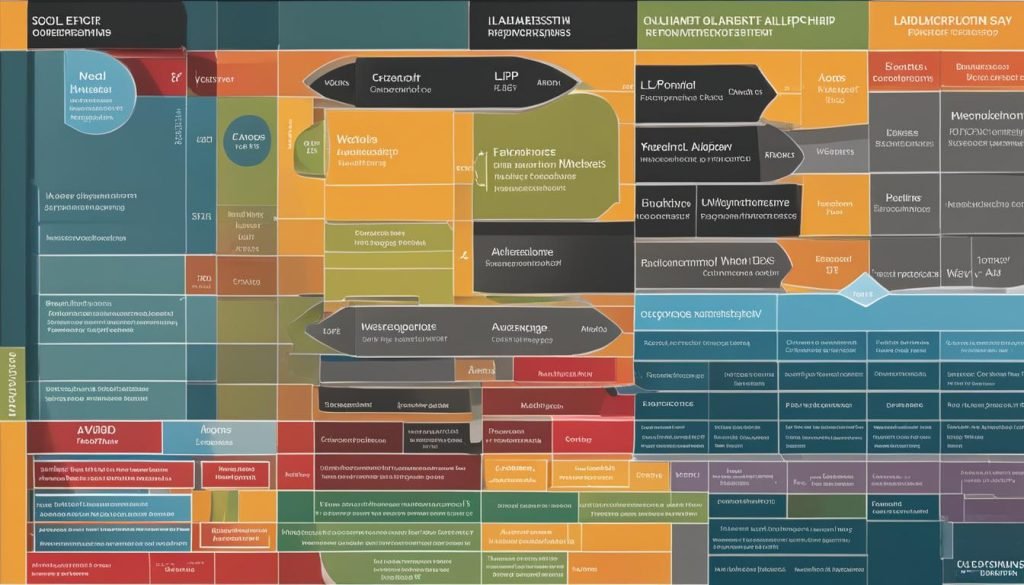When starting a business in Singapore, entrepreneurs face the challenge of selecting an appropriate legal structure. Two common options are Limited Liability Partnerships (LLPs) and Sole Proprietorships, each with their distinct advantages and implications. This article delves into the difference between LLP and Sole Proprietorship and helps aspiring business owners make informed decisions on choosing an ideal business structure in Singapore by comparatively analyzing various aspects, including legal liabilities, tax benefits, and business growth potential. Additionally, we will also discuss Singapore company registration and other services, such as VOffice’s virtual office solutions, that make setting up businesses hassle-free and professional.
Key Takeaways
- LLPs and Sole Proprietorships are prevalent legal structures in Singapore, each with unique attributes and implications.
- While Sole Proprietorships provide absolute control, they expose the owner to unlimited personal liability for business debts.
- LLPs offer limited personal liability protection for its partners, allowing a degree of risk management in business operations.
- Unlike Sole Proprietorships, LLPs enjoy perpetuity as they can continue operating despite changes in their members’ status.
- Both LLPs and Sole Proprietorships are taxed at personal income tax rates, with corporate tax benefits available to LLCs.
- Entrepreneurs should consider business goals, operations, and desired degree of liability protection when selecting a business structure in Singapore.
- Services such as VOffice’s virtual office solutions can facilitate smooth company registration and provide credibility at a competitive price.
Defining the Two: What are LLP and Sole Proprietorship?
Both LLP and Sole Proprietorship are types of Singapore Business Structures. Each has its unique characteristics tailored to different business requirements, benefits, and limitations. Here, we provide the definitions for these two types of businesses.
Sole Proprietorship Definition:
A Sole Proprietorship in Singapore represents the simplest form of a business, where it is owned, managed, and controlled by an individual. This structure offers the advantage of easy setup and complete authority; however, it also exposes the owner to unlimited personal liability, bearing the full brunt of any business debts or legal issues. Additionally, the business ceases to exist when the owner is no longer engaged or has passed away.
LLP Definition:
On the other hand, a Limited Liability Partnership (LLP) represents a hybrid business structure where two or more partners join forces to conduct business activities. This structure provides specific privileges such as limited personal liabilities, as partners are only accountable to the extent of their contributions. A significant characteristic of an LLP is its distinct legal personality, which bestows it with rights to own property, sue or be sued in its name, and continue its operations despite changes in partnership, including the resignation or death of partners.
In summary, a Sole Proprietorship is a single-entity business with unlimited personal liability, while an LLP is a hybrid structure with two or more partners enjoying limited liabilities and a separate legal personality.

Now that we have established the fundamental differences between the two structures, the following sections will further discuss their legal implications, liabilities, taxation, and business growth potential. This information aims to help entrepreneurs make informed decisions when starting a Sole Proprietorship or embarking on the Formation of LLP in Singapore.
Legal Implications and Liability: Protecting Your Interests

When starting a business in Singapore, it is crucial to consider the legal implications surrounding different business structures. Your choice between a sole proprietorship and an LLP will directly impact the level of personal asset risk, liability protection, and perpetuity considerations for your business.
Personal Asset Risk in Sole Proprietorships
A significant concern for sole proprietorships is the unlimited liability associated with the business structure. In this model, the owner and the business are considered one and the same from a legal perspective, exposing the owner’s personal assets to the risk of business debts, lawsuits, and failures.
Sole Proprietorship Liability implies that there is no legal distinction between the business and the individual, potentially jeopardizing all the owner’s personal assets in the face of business losses.
As a result, entrepreneurs operating under a sole proprietorship need to be aware of the potential legal risks in business and take steps to protect their personal assets as best they can.
Limited Liability in Partnerships
Conversely, an LLP offers a higher level of protection for individual partners through its limited liability structure. The liabilities are generally restricted to each partner’s contribution in the partnership, safeguarding the personal assets of the partners from the business’s obligations and losses.
- Business Debt Protection: LLPs separate business debts from personal financial obligations, ensuring that personal assets are safe from business failure.
- Partner Protection in LLP: The limited liability structure shields individuals from debts incurred and wrongful actions committed by other partners.
These critical LLP advantages allow entrepreneurs to focus on developing their business without the risks that arise with a sole proprietorship.
Succession and Perpetuity Considerations
Another critical factor to consider is the impact of a business structure on its continuity and succession planning. An LLP in Singapore provides a sense of stability and longevity through its ability to maintain perpetual succession, ensuring business operations are unimpacted despite personnel changes or the departure of partners.
- Business Succession Planning: Planning for the future is vital, and an LLP’s structure allows the seamless continuation of the business when partners resign or pass away.
- Perpetuity in Business: The LLP’s legal separateness guarantees the company continues to exist and operate independently of its partners.
- Business Continuity: With its perpetual succession, an LLP is capable of providing stability and endurance over the long term.
By offering LLP perpetual succession, this business structure guarantees a level of continuity that sole proprietorships simply cannot match, making it an attractive option for those looking to build a lasting enterprise in Singapore.
Tax Benefits and Burdens: How Your Choice Affects Finances
An essential aspect to consider when choosing between a Sole Proprietorship or an LLP in Singapore is their respective tax implications. While each structure offers different advantages, understanding the specific tax consequences is crucial for making an informed decision. Below, we discuss the taxation policies for Sole Proprietorships and LLPs in Singapore and compare them to an LLC (Limited Liability Company), another popular business structure in the country.

Important note: This article provides general guidance, but professional tax advice should always be sought when it comes to specific tax matters. Laws and regulations change, and individual circumstances may differ.
Sole Proprietorship Tax and LLP Taxation
Both Sole Proprietors and LLPs in Singapore experience taxation at the level of their personal income, with business profits treated as personal income. These individuals are subject to Singapore personal income tax, which features progressive rates ranging from 0% to 22% for resident taxpayers.
- For Sole Proprietorships, the owner is personally taxed on the entire business income, minus allowable deductions.
- For LLPs, tax liabilities are allocated to respective partners in proportion to their share in partnership profits. Each partner is taxed according to their share in the business income, minus any deductible expenses attributed to them.
It’s essential to note that both Sole Proprietorships and LLPs do not qualify for the various Singapore tax exemptions and rebates that some corporate entities, such as LLCs, may enjoy.
Tax Benefits of an LLC
In contrast to Sole Proprietorships and LLPs, an LLC is considered a separate legal entity and taxed at corporate tax rates. While Singapore’s corporate tax rate is a flat 17%, various tax incentives, exemptions, and rebates often reduce the effective tax burden on businesses.
- Newly incorporated companies (that fulfill the qualifying conditions) enjoy a 75% exemption on the first SGD 100,000 of chargeable income and a 50% exemption on the next SGD 100,000 for their first three consecutive years.
- Corporate entities can also take advantage of Singapore’s Productivity and Innovation Credit (PIC) scheme, which aims to support businesses in their efforts to improve productivity and innovation by offering tax deductions or cash payouts on qualifying expenditures.
As a consequence, an LLC may pay significantly lower taxes on initial profits compared to Sole Proprietorships and LLPs, highlighting the importance of considering tax implications when selecting a business structure.
In conclusion, understanding the tax implications of different business structures is vital before making your choice. While Sole Proprietorships and LLPs face taxation at the personal income level, LLCs enjoy a more favorable corporate tax regime and may be a more suitable option for some entrepreneurs. Consequently, it’s crucial to evaluate these financial effects in the context of your business objectives and operational requirements.
Raising Capital and Business Growth Potential
Both Sole Proprietorship and LLP business structures can provide unique opportunities for growth and success. However, one significant challenge these structures face is the ability to raise capital and secure financing for business expansion in Singapore.
For Sole Proprietorship, fundraising is often limited to personal funds, profits, or loans that usually require personal asset collateral.
“Sole proprietorships in Singapore face challenges in raising capital and often rely on personal funds or profits, while being limited in their ability to secure loans without personal asset collateral.”
The absence of a separate legal entity and unlimited personal liability can deter investors and financial institutions from backing Sole Proprietorship businesses, hindering their growth potential.

On the other hand, LLPs also face challenges in raising external capital, as it is often tied to partners’ contributions. While an LLP’s limited liability and legal entity status offers some advantages, it can still struggle to secure venture capital funding or business financing. Consequently, the growth potential of an LLP is also limited compared to private limited companies.
- Raising Capital: Limited by partners’ contributions in LLPs and personal reliance in Sole Proprietorships.
- Securing Loans: Challenging for both structures, typically requiring personal asset collateral for Sole Proprietorships.
- External Investment: Difficult to attract in both cases due to lack of a separate legal and financial entity.
In contrast, private limited companies often have a more accessible and attractive environment for growth and expansion activities through equity partners, venture funds, and business financing. Considering these factors, entrepreneurs must evaluate each business structure’s viability carefully based on their capacity for raising capital and their potential for business growth in Singapore’s competitive market.
Conclusion
Entrepreneurs in Singapore face the critical decision of selecting the most suitable business structure for their needs. Both LLP (Limited Liability Partnership) and Sole Proprietorship offer unique advantages and implications that are crucial to consider in the business registration process. An LLP is desirable for business owners seeking limited liability protection, while allowing for the flexibility of perpetual succession. In contrast, a Sole Proprietorship emphasizes total control and simplicity of operations but lacks the liability protection that an LLP can provide.
Understanding the characteristics of each structure is essential in choosing the right business structure, with factors such as liability, tax benefits, and growth potential playing influential roles. Additionally, entrepreneurs may require supplementary services such as Virtual Office Services offered by companies like VOffice to establish a prestigious business address. A credible business address can facilitate a smooth setup process while enhancing your company’s reputation in the competitive Singapore market.
In conclusion, it is crucial for business owners to evaluate their goals, resources, and long-term plans when determining the ideal business structure for their entrepreneurial endeavors in Singapore. By doing so and relying on relevant support services, entrepreneurs can create a solid foundation for successful operations and continuous growth in the competitive Singapore business landscape.
FAQ
What is the main difference between an LLP and a Sole Proprietorship?
The main difference between an LLP (Limited Liability Partnership) and a Sole Proprietorship is that an LLP has limited liability, protecting personal assets from business debts, while a Sole Proprietorship has unlimited liability, exposing the owner’s personal assets to business debts. In addition, an LLP has an enduring structure with the ability to continue despite changes in partnership, while a Sole Proprietorship ceases to exist upon the owner’s departure.
How does taxation work for Sole Proprietorships and LLPs in Singapore?
Both Sole Proprietorships and LLPs are taxed at personal income tax rates, with business profits treated as personal income. However, a separate business structure, an LLC (Limited Liability Company), enjoys corporate tax rates and may benefit from various exemptions and rebates.
What are the implications of personal asset risk in Sole Proprietorships?
In a Sole Proprietorship, the owner’s personal assets are directly exposed to the risk of business debts and losses, as the owner and the business are legally considered the same entity. This potentially jeopardizes all personal assets of the proprietor.
How does limited liability work in an LLP?
Limited liability in an LLP separates personal assets from the business liabilities of the partners to an extent. The liability is typically limited to the partner’s contribution in the partnership and does not extend to personal assets, protecting individual partners from debts and wrongful actions of other partners.
What is the significance of perpetual succession in an LLP?
Perpetual succession is an advantage of an LLP, meaning that the business continues unaffected, regardless of changes in its members due to resignation or death. This grants the business a sense of continuity and stability over time.
How does raising capital differ between a Sole Proprietorship and an LLP?
Sole proprietorships often face challenges in raising capital and may rely on personal funds or profits. Their ability to secure loans may be limited without personal asset collateral. While LLPs also encounter difficulties raising external capital, a private limited company structure allows the raising of funds through equity partners, venture funds, and business financing, which is often more accessible and attractive for growth and expansion activities.

